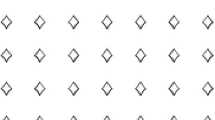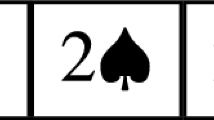Abstract
Suppose we have a stack of cards that is divided over some players. For certain distributions of cards it is possible to communicate your hand of cards to another player by public announcements, without yet another player learning any of your cards. A solution to this problem consists of some sequence of announcements and is called an exchange. It is called a direct exchange if it consists of (the minimum of) two announcements only. The announcements in an exchange have a special form: they are safe communications, an interesting new form of update. Certain unsafe communications turn out to be unsuccessful updates. A communication is a public announcement that is known to be true. Each communication may be about a set of alternative card deals only, and even about a set of alternatives to the communicating player's own hand only. We list the direct exchanges for a deal of seven cards where the two players holding three cards communicate their hands to each other. Our work may be applicable to the design of cryptographic protocols.
Similar content being viewed by others
References
Agray, N., W. Van Der Hoek, and E. De Vink, ‘On ban logics for industrial security protocols’, in B. Dunin-Keplicz and E. Nawarecki, (eds.), From Theory to Practice in Multi-Agent Systems, pp. 29-38. LNAI 2296, Springer, Berlin, 2002.
Baltag, A., ‘A logic for suspicious players: Epistemic actions and belief updates in games’, Bulletin of Economic Research, 54(1):1-45, 2002.
Burrows, M., M. Abadi, and R. Needham, ‘A logic of authentication’, ACM Transactions on Computer Systems, 8:18-36, 1990.
Engelhardt, K., R. Van Der Meyden, and Y. Moses, ‘Knowledge and the logic of local propositions’, in I. Gilboa, (ed.), Proceedings of TARK VII, pp. 29-41. Morgan Kaufmann, Los Altos, 1998.
Fagin, R., J. Y. Halpern, Y. Moses, and M. Y. Vardi, Reasoning about Knowledge, MIT Press, Cambridge MA, 1995.
Fischer, M. J., and R. N. Wright, ‘Bounds on secret key exchange using a random deal of cards’, Journal of Cryptology, 9(2):71-99, 1996.
Gerbrandy, J. D., Bisimulations on Planet Kripke, PhD thesis, University of Amsterdam, 1999. ILLC Dissertation Series DS-1999-01.
Gerbrandy, J. D., and W. Groeneveld, ‘Reasoning about information change’, Journal of Logic, Language, and Information, 6:147-169, 1997.
Graham, R. L., M. Grotschel, and L. Lovasz, (eds.), Handbook of Combinatorics, MIT Press, Cambridge MA, 1996.
Makarychev, K., Logicheskie voprosy peredachi informacii (logical issues of information transmission), Master's thesis, Moscow State University, 2001. Diplomnaja rabota, part 1.
Makarychev, K. S., and Yu. S. Makarychev, ‘The importance of being formal’, Mathematical Intelligencer, 23(1):41-42, 2001.
Meyer, J.-J. Ch., and W. Van Der Hoek, Epistemic Logic for AI and Computer Science. Cambridge Tracts in Theoretical Computer Science 41, Cambridge University Press, Cambridge, 1995.
Plaza, J. A., ‘Logics of public communications’, in M. L. Emrich, M. S. Pfeifer, M. Hadzikadic, and Z. W. Ras, (eds.), Proceedings of the 4th International Symposium on Methodologies for Intelligent Systems, pp. 201-216, 1989.
Stulp, F., and L. C. Verbrugge, ‘A knowledge-based algorithm for the internet transmission control protocol (tcp)’, Bulletin of Economic Research, 54(1):69-94, 2002.
Van Benthem, J. F. A. K., ‘Logics for information update’, in J. F. A. K. van Benthem, (ed.), Proceedings of TARK VIII, pp. 51-88, Morgan Kaufmann, Los Altos, 2001.
Van Benthem, J. F. A. K., P. Dekker, J. Van Eijck, M. De Rijke, and Y. Venema, Logic in Action, ILLC, Amsterdam, 2002.
Van Ditmarsch, H. P., Knowledge games, PhD thesis, University of Groningen, 2000. ILLC Dissertation Series DS-2000-06.
Van Ditmarsch, H. P., ‘Killing cluedo’, Natuur & Techniek, 69(11):32-40, 2001.
Van Ditmarsch, H. P., ‘Knowledge games’, Bulletin of Economic Research, 53(4):249-273, 2001.
Van Ditmarsch, H. P., ‘Descriptions of game actions’, Journal of Logic, Language and Information, 11:349-365, 2002.
Van Ditmarsch, H. P., ‘Oplossing van het mysterie (solution of the murder mystery)’, Natuur & Techniek, 70(2):17, 2002.
Van Ditmarsch, H. P., W. Van Der Hoek, and B. P. Kooi, ‘Descriptions of game states’, in I. van Loon, G. Mints, and R. Muskens, (eds.), Proceedings of LLC9 (2000), CSLI Publications, Stanford. To appear.
Author information
Authors and Affiliations
Rights and permissions
About this article
Cite this article
van Ditmarsch, H. The Russian Cards Problem. Studia Logica 75, 31–62 (2003). https://doi.org/10.1023/A:1026168632319
Issue Date:
DOI: https://doi.org/10.1023/A:1026168632319




